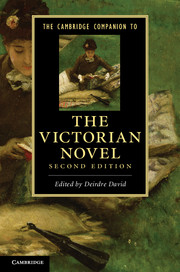Book contents
- Frontmatter
- Contents
- Notes on contributors
- Chronology
- Introduction
- 1 The Victorian novel and its readers
- 2 The business of Victorian publishing
- 3 A history of criticism of the Victorian novel
- 4 Victorian realism
- 5 Intellectual debate in the Victorian novel
- 6 Race and the Victorian novel
- 7 Social class and the Victorian novel
- 8 When gender meets sexuality in the Victorian novel
- 9 Victorian feelings
- 10 Sensation and the fantastic in the Victorian novel
- 11 The transatlantic novel in the nineteenth century
- Guide to further reading
- Index
- References
6 - Race and the Victorian novel
Published online by Cambridge University Press: 05 December 2012
- Frontmatter
- Contents
- Notes on contributors
- Chronology
- Introduction
- 1 The Victorian novel and its readers
- 2 The business of Victorian publishing
- 3 A history of criticism of the Victorian novel
- 4 Victorian realism
- 5 Intellectual debate in the Victorian novel
- 6 Race and the Victorian novel
- 7 Social class and the Victorian novel
- 8 When gender meets sexuality in the Victorian novel
- 9 Victorian feelings
- 10 Sensation and the fantastic in the Victorian novel
- 11 The transatlantic novel in the nineteenth century
- Guide to further reading
- Index
- References
Summary
“All is race; there is no other truth.” So says Sidonia, Benjamin Disraeli’s fictional Jewish sage and alter ego. The novel in which Sidonia makes this pronouncement is Tancred (1847), the third in Disraeli’s Young England trilogy. Even during his years as Prime Minister, Disraeli continued to believe in race as an all-encompassing explanatory category. Thus, in his 1870 novel Lothair, Paraclete, a Syrian, tells the young protagonist:
God works by races … The Aryan and the Semite are of the same blood and origin, but when they quitted their central land they were ordained to follow opposite courses. Each division of the great race has developed one portion of the double nature of humanity, till after all their wanderings they met again, and, represented by their two choicest families, the Hellenes and the Hebrews, brought together the treasures of their accumulated wisdom and secured the civilisation of man.
The metaphor of “choicest families,” suggesting divinely chosen branches of the one “great race,” provides Disraeli with a formulaic – indeed, stereotypic – explanation of western civilization and its two ancient sources, classical Greece and Judaeo-Christianity.
That Disraeli, through Sidonia and Paraclete, is expressing a widely held Victorian view of race as the mainspring of world history is evident from Culture and Anarchy (1869), in which poet and critic Matthew Arnold employs “Hellenism” and “Hebraism” as racial terms to distinguish the chief tendencies of western civilization. Arnold believed that he was echoing the latest findings of “ethnology,” an early version of physical anthropology that scholars today treat as a pseudo-science of racial difference. “Race is everything: literature, science, art, in a word, civilization, depend on it”: so, sounding like Sidonia, declared Dr. Robert Knox in The Races of Men (1850). Foreshadowing Count Gobineau’s influential Essay on the Inequality of Human Races, published in France in the early 1850s, Knox argued that historical change is due to the physical and mental inequalities among races; that race hatred and conflict are inbred factors in human nature; that war and imperial expansion are the results of this hatred; and finally, that where climate does not affect the outcome, the fair, stronger races invariably defeat and either enslave or exterminate the dark, weaker races.
- Type
- Chapter
- Information
- The Cambridge Companion to the Victorian Novel , pp. 129 - 147Publisher: Cambridge University PressPrint publication year: 2012
References
- 3
- Cited by



